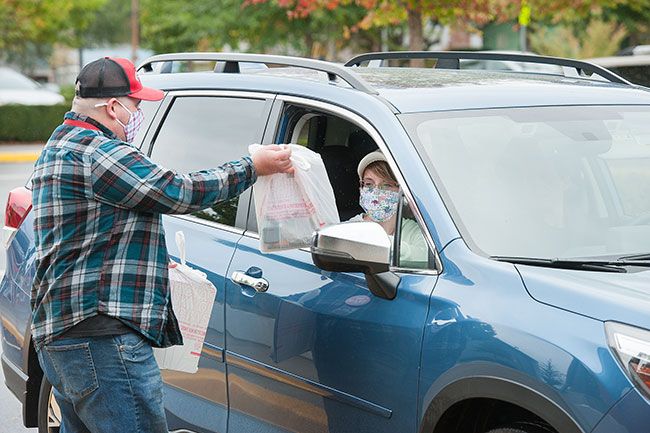Distance learning: Parents see good, bad, complications

The format is no one’s first choice — not what students would choose, if they could; not what educators or parents say they would pick, either.
But it’s a necessary step, according to state Department of Education and health officials, as well as the governor. And it’s only temporary, they say, until the coronavirus pandemic is under control.
We hope so, say parents and educators alike.
Most families say they understand the need for distance learning. The majority claim they are fairly satisfied, although many say it’s not the ideal situation, especially for young students.
A poll on a local Facebook page drew more than 180 responses.
Seventy-five people said distance learning is going well, and another four identifying themselves as students said the same. Another 35 respondents said it’s “sort of working, might get better.”
Nine said their feelings about the school year thus far are mixed. Forty-two said it’s not going well, and 16 said they switched to home schooling.
Parents say distance learning takes up more of their time since they need to monitor what their kids are doing. And some say their children are bored from viewing a screen much of the day.
Others say their children have a harder time understanding concepts, including how to use their computers. And some say their kids are very stressed about using the computer.
Teachers say they wish they could sit beside each student to help them learn. They find it takes more time to plan and deliver lessons using videos, as well as live instruction. Most of all, they miss the children and the close relationships that are built when everyone is in the same room.
Almost all students have access to computers and the internet. McMinnville and other school districts provided Chromebooks and WiFi Hotspots for them to check out if they didn’t have their own.
Still, parents mention technology problems, saying they feel frustrated by the first few days of comprehensive distance learning.
“This is pure chaos,” Jodi Garcia wrote on Facebook.
She’s been helping her daughter with the education of her three grandchildren, who are in kindergarten, sixth grade and seventh grade. The oldest uses headphones, but the two youngest keep their computers’ sound turned up, so their mother can monitor what they’re doing. The dueling instruction makes it difficult for either to hear their teachers.
“I would honestly be surprised if they are able to absorb any of what they are being taught in this forum,” Garcia said.
Cortney Thomas said her second-grade daughter is "eager to tackle challenges" and generally deals well with obstacles. But "even she is struggling," her mom said.
While Thomas is pleased with her daughter's teachers, "the amount of screen time, the schedules and class set ups are just not sustainable for teachers, students and parents."
She said she knows parents who have already given up and taken their children out of public school.
She's worried about the future, too. "This mode of education is literally taking away everything children love about school and the ramifications will far outlast the closures and could be lifelong," she said.
Another grandmother wrote that her daughter had to quit a job in order to oversee her two children’s online learning. The first week was rough, she said.
Carran Lovas of McMinnville wrote on Facebook she and her children are starting to figure things out. “Each day gets a little better,” she said, although her youngest, a second grader, still needs a lot of assistance.
Lovas said it helps that she’s a stay-at-home mom. “I can’t imagine what it’s like for working and working-at-home parents,” she said.
Other parents also said it’s difficult to juggle their children’s schooling and their own work.
Travis and Kitri McGuire have figured that out, for the time being, at least, by each spending one day a week at home overseeing their two sons’ lessons.
“We’re privileged to have very flexible, understanding employers,” he said. He works for Linfield University, and his wife works for Visit McMinnville.
The other three days, Luke, a fourth-grader, and Peter, a first-grader, go to a daycare center where the staff helps children with online schooling. The McGuires appreciate the program, although it costs about 30 percent of their salaries, he said.
It’s not sustainable, McGuire said, and it’s not ideal.
“This is not how children are meant to learn,” he said. “They need in-person connections with humans. They need to be with their teachers so they can raise their hand and get help.”
The McGuire boys like their school, Memorial Elementary, and their teachers, their dad said. But they miss having in-person classes, especially Peter, who had been in school only about six months before the coronavirus closure.
The first-grader has yet to master reading, so he cannot use his computer on his own. He’s also still learning concepts such as how to use a mouse and how to behave appropriately and pay attention in class.
Luke is somewhat more independent. And both he and his younger brother are doing better with the comprehensive distance learning format than they did with the less-structured remote learning offered in spring.
The boys have each other to play with, but they would benefit from more interaction with their classmates, McGuire said.
When Peter sees a friend from school or daycare, he starts waving excitedly. “That tells me he misses those real connections,” his dad said.
He hopes Peter and Luke can return to classes at Memorial soon.
“School is very necessary, especially for the youngest students,” McGuire said. “They need the basics to build on.”
Lon Skene and his wife have a daughter in second grade, also at Memorial. He said their experiences with comprehensive distance learning “have been fairly positive thus far.”
He appreciates that the fall program is more organized than the remote learning of spring. His daughter’s teacher and principal at Memorial Elementary are making it a good experience, he said; the teacher tries to connect with each child and get to know them, their families and pets.
Some of the family’s friends haven’t had equally positive experiences, and he knows some families are struggling, but he said, “we couldn’t be happier.”
Both Skene and his wife work remotely. Their daughter has watched them use their computers for work and has played at typing letters, sending emails and wearing headsets to take calls, so she was comfortable using the technology for distance learning.
“In my opinion, she’s doing great.” he said. It “hasn’t hindered her love of learning. She enjoys the technology aspect and seems to be thriving so far.”












Comments
Hibb
I wonder how long before we start to see indicators of how treacherous this whole situation is/was and how many students ended up getting left behind in the process? Our teachers deserve a boat-load of credit and respect (in lieu of cash of course, as we do not want to overpay them) and this latest hiccup (optimistically inserted here) affords whole new challenges and will require a whole new skill set.
Sadly, our teachers are not just teachers, but also serve as glorified babysitters because of a lack of structure and nurture at home. They have to daily navigate the minefield that a public education has become and among their charges, there are and will be those students that are emotionally, financially, and in some cases physically challenged and challenging. My generation never had to worry about the possibility of yet another school shooting, as we did not have to deal with that back then, but today -alas- it is all too commonplace.
With students out of the traditional classroom and now in their own room with the door closed or out at the dining table doing their school work, there is much less supervision in place and a subsequent decay in many settings of the discipline that is needed to successfully transform these young mush-heads into proper adults one day. In light of this, what if anything is being done to encourage parents to participate in their child's education and not just leave it up to the teacher to magically make everything alright?
Parents must be involved in their children's education and if they fail to do so, then one day we will see a bumper crop of misfits crowding into drug court instead of a library.